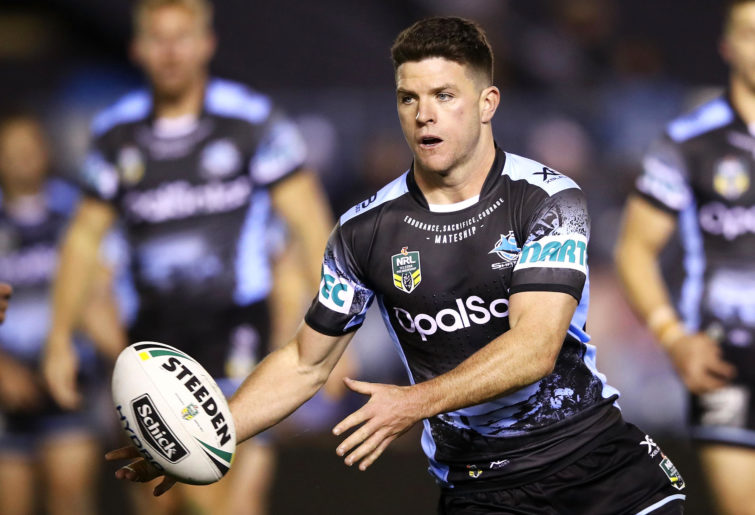
Even if a near identical incident hadn’t happened over 20 years earlier, Corey Norman’s mid-week antics are by no means out of place in the soap opera that is the greatest game of all.
When you thought you’d heard it all, a player or official will engage in actions that defy universal logic.
In an attempt to defend the NRL’s players (some of whom are more defendable than others), a game of rugby league at the top level plays out at a rate non-conducive to making decisions of an accepted rationale. When ultimate physical and mental fatigue kicks in, the brain sometimes simply can’t keep up.
With this in mind, let’s revisit some of the more memorable brain explosions in the NRL.
Terry Lamb field goal – Round 14, 1992
As much poor attention to detail as a brain explosion, Terry Lamb’s field goal against Newcastle has become rugby league folk law. Newcastle’s’ John Shuster had finished off an enterprising piece of backline play, and scored in the right corner of Belmore Sports Ground.
Shuster then went on to convert his own try, handing the Knights a 14-12 lead.
Not realising the try had been converted, with three minutes to go, Terry Lamb, as cool as you like, potted a field goal, thinking he’d won his mighty Bulldogs the game. However, his teammates were quick to remind Lamb in no uncertain terms that the a one-point field goal would not be enough to get them the lead, with the Bulldogs losing the game 14-13.
At least Terry could draw a positive from the situation when he said: “I just had a black out… I went for a field goal. Was a great kick too!”
Brad Morrin bite – Round 21, 2007
Not the first player to nibble on an opponent, and not the last, however Brad Morrin is one of the few who have admitted his guilt, rather than fight the charge at the judiciary. When the Canterbury-Bankstown front rower was headslammed by Paramatta’s Timana Tahu during a clash between the western Sydney rivals, Morrin admitted to using the unconventional method to force the defender off him while his hands were pinned.
He took ownership of his actions, explaining: “More or less I gave him a nip to get him off, but I was more shocked than anything when I saw the mark it left. I didn’t think I could do it that hard with my mouthguard in.
“I did go and apologise to him after it, it was a bit of a brain snap. I haven’t done it before and I don’t think I’ll do it again.”
Chad Townsend shoulder charge – Round 17, 2020
Cronulla’s Chad Townsend’s flying shoulder charge on Newcastle fullback Kalyn Ponga was one of the more bizarre brain explosions likely to be witnessed in the NRL.
Ponga was in the process of attempting to execute a quick 20-metre restart when the referee’s whistle put a halt to proceedings. Townsend, who had lined the Knights fullback up from 10 metres away, had missed the memo, coming flying out in a beeline for the now-stationary Ponga.
Becoming airborne, the shoulder of the Cronulla half made direct impact with Kalyn’s head, inflicting extreme force, snapping his head and neck backwards in a violent fashion.
The referee had no choice but to send Townsend off, while the man himself later summed up the situation perfectly when he said: “It was never my intention to shoulder charge, it was never my intention to take his head off.
“It was more just me trying to make a big play by stopping him. I braced myself for impact and I got it wrong.”

(Photo by Mark Kolbe/Getty Images)
Mitch Barnett elbow – Round 4, 2022
An inexplicable elbow to the jaw of Penrith second rower Chris Smith is the most recent brain explosion prior to Corey Norman’s display. It was earlier this season when Newcastle backrower Barnett’s elbow made sickening contact with Smith, after the latter had run a decoy run on the right edge and was effectively out of play.
Not only did Smith have no impact in the play, but in no way was he preventing Barnett from coming across to prevent the attacking raid, making it even harder to find logic in the Novocastrian’s actions.
After receiving his marching orders, and upon reflection Barnett admitted: “I got the tackle wrong.
“It’s all I can think of. I didn’t intentionally go out to do that. It was something that happened. I’m not denying it looked ugly. It could’ve potentially been very bad.”
John Hopoate – Round 6, 2001, Round 14, 2004, Round 2, 2005
Holding the record for the most suspended player in the history of the NRL, Manly and Wests Tigers’ John Hopoate is the undisputed king of the brain explosion.
Unfortunately for the former Kangaroo representative, his main claim to fame is the aforementioned predecessor to Norman’s incident, when in 2001 Hopoate was found guilty of inserting his finger into the anuses of three different North Queensland players during an early-season fixture.
The events inflicted on Glenn Morrison, Peter Jones and Paul Bowman were referred straight to the judiciary, costing John 12 weeks on the sideline.
In 2004 the firebrand copped a nine-week ban for threatening a match official, a brain snap which could be regarded as minor, compared to the viscous attack on Cronulla forward Keith Galloway in 2005. Playing for Manly against the Sharks, Hopoate came spearing out of the defensive line, flying through the air with reckless abandonment, elbow cocked, making contact with the head of the 195-centimetre prop.
Completely knocked out and bleeding from the ear, Galloway took no further part in the game, having no recollection of the event, while Manly rightfully terminated Hopoate’s contract. This one brain snap to many was the straw that broke the camel’s back, as John Hopoate never played in the NRL again.

Leave a Reply